I began this blog in April 2006 shortly after my book The Jesus Dynasty had come out and immediately hit the New York Times best seller list with interview on GMA, Nightline, 20/20 and several major magazine features. I was completely new to the world of blogging. Since that time I have published about 1000 posts and chalked up a total of five million “page views” with over two million readers. About a year after I started, as my blog began to pick up readers and quickly rose into the upper rankings of the “Top 50 Biblioblogs” ranking, a rarified distinction among those several hundred of us who do regular blogging on some aspect of religion or Biblical studies.

In April 2007 I did an interview with Brandon Wason as “Blogger of the Month” on the Biblioblog Top 50 web site. The research on the Talpiot “Jesus tomb” was just coming out at the time. I thought my readers might enjoy taking a look at what I said then and how I may have changed over the past few years. The topics covered were wide ranging, from the academic to the personal. I don’t think that site is active but you might want to take a look at their profile of all the “Biblioblogs” that were in operation when it was last updated in 2018–as the vast range of topics is really impressive with lots of archived materials documenting the history of this whole “Biblioblog” phenomenon, similar interviews with dozen of other BiblioBloggers that you might find interesting–check it out here.
Anyway, here is my interview from 2007:
BW: Thank you, James, for agreeing to be our featured blogger amidst your busy schedule.
How did you become interested in the discipline of religious studies?
JT: I began my freshman year at Abilene Christian University in 1966 and Abraham Malherbe had just arrived to teach New Testament there. Everett Ferguson was already there. I took them both and was hooked permanently it seems. I began Koine Greek that year as well and ended up majoring in Greek with a second major in Bible and Ancient History. This was my first introduction to the academic study of religion. I did my M.A. in Bible at Pepperdine and came under the spell of the late Frank Pack, as well as William Green, the great classicist and Augustinian scholar who retired from UC Berkeley. Finally, at the University of Chicago I was completely and throughly pulled into this field “til death do us part” by the fascinating Jonathan Z. Smith, the church historian Robert M. Grant, and the N.T. scholar Norman Perrin.
BW: Last month we interviewed James Spinti. For him, personal religion played an important role in his life. Are you a religious person, or is your interest in religion strictly academic?
JT: I am tempted to say like my students, “I am not religious but spiritual,” but I actually hate that Oprah-like formulation as I think most of us do. Yes, I am “religious” if by that you mean that I understand the universe and our human place therein from a theistic perspective, though my theism is very much along the lines of Whitehead & Hartshorn. In terms of biblical materials I much prefer the messiness of the ancient Hebrew experience, part and parcel in this world, than the Hellenistic dualism in which the our N.T. documents have their being. In terms of the “strictly academic” though I should also add that I am chair of one of the largest departments of religious studies in the country (25 faculty with 18 full-time) so it is a challenge to me as the visionary leader of this amazingly diverse and bright faculty to represent our collective enterprise in the broadest possible way within a wholly secular academy. That does indeed push me often more toward the academic side of things in an effort to reflect the best our field has to offer.
BW: Do you think that “religious” scholars are at a disadvantage when it comes to “objectivity”?
JT: Yes and No. I have a recent Blog posting on this called “Nonsense and the Academic Study of Religion.” I think if those of any faith are committed to a literalism and the notion of an inerrant scripture or set of theological dogmas it becomes extraordinarily difficult, I would even say impossible, to carry one the work of an historian, which I see as the heart of my own work as a scholar of Christian Origins. On the other hand, I think a sympathetic “faith” perspective can aid one in “imagining” religion and understanding the powerful ways in which religion shapes “reality,” that is, reality defined as the constructed worlds that we each inhabit.
BW: Last year your book The Jesus Dynasty was published and became a bestseller. This is impressive since books dealing with biblical studies aren’t often this successful. What is so important about this work and to whom were you writing?
JT: Yes, it has been quite a “ride,” in terms of going from the strictly “academic” world to the mass trade market. Simon & Schuster is unlike any publisher I have ever dealt with and it was a new world for me, but thoroughly positive in terms of how it all worked out. My editor, Bob Bender, is as sharp and seasoned as they come and had actually worked with others in our field in the past. The book has now sold in 25 languages. I never expected anything of this magnitude. On the other hand, I worked hard to find a “voice” that would be accessible for the average non-spet. I had to make quite a few decisions in that regard in terms of the type of endnotes I would include and to what degree I would write “for” my colleagues, with all the complexities of the debates in our field reflected, and to what degree I would simply set forth in an accessible way what I considered to be a compelling portrait of the “historical Jesus.” I think many of us who teach Christian origins think in terms of someday doing “the Jesus book.” I remember joking with Bart Ehrman when he published his own Jesus book in 1999, just in time for the millennium–I said to him, “Bart, you are not yet 50 years old and you have written a book on Jesus.” In my case I waited until I was 60 although I actually outlined the book as early as 1990 and almost sold a version of it back then, called The Jesus Family, to Element in England. I am glad I waited as I knew “nothing” back then and I only begun, that year in fact, to learn a bit about archaeology and include the material evidence as part of my consideration of texts. What I seek to do in this book is give the readers what I think is an accurate glimpse, even a “sense” or “feel” of the radical apocalyptic movement/s of late 2nd Temple Judaism of which I think Jesus was fully a part. I dedicate the book to Albert Schweitzer, a personal hero. I still think his book on Jesus and the Kingdom and his book on the Mysticism of Paul say more than oceans of ink subsequently spread around the world on the subject of understanding Christian Origins. I also endeavor to “rehabilitate” the memory of three largely lost and forgotten characters: Jesus’ mother Miriam, as a Jewish mother of seven children; John the baptizer as inaugurated and mentor, rather than side stage “forerunner” of Jesus, and James the “beloved” brother of Jesus, largely forgotten in time and history. At the end of the book, at my editor’s urging, I also included a “Conclusion” that tries to say something in terms of the “So what?” of the kind of “thoroughgoing eschatology” that I espouse.
BW: Given that nearly a full year has past since it was published, what would you change, if anything, about the book?
JT: Yes, I think I would change a few things. I would explore more fully several other alternatives to the Joseph/Cleophas theory I present and I hope, in the course, of doing so, would come up with a stronger defense of why I think my proposal fits the evidence the best. I would also completely change my “empty tomb” scenario. I think I was still under the spell of trying to take Matthew’s appearance to the women at the tomb as somehow “historical,” but now, other than the experience of Mary Magdalene recorded only by John, I am tending to think all the appearances were late and apologetic. In working on my new book on Paul I have had to throughly rethink and recast what I think happened after Jesus’ death and what those first 20 years might have been like in terms of the focus of the movement, now led by James the brother of Jesus.
BW: When and why did you start blogging?
JT: My Blog was wholly tied to the publication of the book. I found that I immediately had thousands of people writing me, eventually from all over the world, and the Blog seemed the best way to begin to address the many queries, objections, and suggestions I was getting. It also allowed me to continue to develop ideas and change things along the way based on the input I was getting from both academic readers as well as the public. I have been amazed at how knowledgeable readers have been of the subject matter of the book and how many who are not professionally in our field seem to have such a wide grasp of the basic issues.
BW: What has been your experiences with blogging? Do you see it as helpful to academic discussion? What would you say are the weaknesses and woes of blogging?
JT: My experience has been almost wholly positive from my own end of things. It is a wonderfully free and easy way to explore ideas and share ongoing and developing thoughts. The “woes” of blogging for me have come with my brief experience with the “Comment” feature which I late had to block on my blog. My book and my work, with its explicit statements about all humans having fathers and corpses not rising from the dead and ascending into heaven have brought on, more than I could have ever imagined, such a mass of nasty, rude, and sarcastic comments that I was quite shocked. It is interesting, of the 10,000 or so e-mails I have received from readers of my book I would estimate not more than 100 have been rude or even particularly negative. Somehow, most people who bother to look me up (my e-mail is not listed in the book or on the Blog) and write me seem to do so to offer something positive. In contrast, with the blog, it was drawing dozens and dozens of insulting comments almost to the point one might label it as spam, though I think it was actually not technically spam, just groups of irate people who wanted to tell me off. There was a time when I used to follow up on other blogs that had mentioned my blog or my book but I found such a level of rudeness and a tabloid like inaccuracy with regard to facts, that I quit reading these things. I was finding it too time consuming and I began to realize I could never address what several thousand people out there might say about me or my ideas or in any way expect to change the negative and insulting attitudes.
BW: Which Blogs do you read?
JT: Mark Goodacre always, because he is so sane and fair with everything. Jim Davila because I think he keeps the pulse of more things in our field than anyone else. An obscure guy called Jim West, because he is always interesting and on top of just about everything. Tyler Williams because he is scrupulously fair and always interesting. That’s about it for the regulars.
BW: Which scholars have been most influential to you?
JT: As a younger undergraduate clearly Abraham Malherbe and Everett Ferguson, two amazing products of Harvard in the days of A.D. Nock. Then in graduate school Jonathan Z. Smith and Robert M. Grant, first and foremost, and Morton Smith who became a good friend. Since then Eugene Gallagher, Arthur Droge, Richard Bauckham, Bruce Chilton, Bart Erhman, Dom Crossan, E. P. Sanders, Jacob Neusner, Geza Vermes, Jim Strange, Jorunn Jacobson Buckley, Paula Fredriksen, Sean Freyne, Robert Eisenman, Shimon Gibson, Joan Taylor.
BW: It has been a couple of weeks now since the airing of The Lost Tomb of Jesus. How successful do you think the film was? Are you still being inundated with emails, threats, and questions?
JT: Well it has obviously been slammed in a very hard way from multiple quarters. I expected it of course, from the evangelical Christian “right,” but I did not anticipate the level of personal slander and innuendo directed against Simcha Jacobovici and James Cameron, both of whom I like and respect. Things have died down now but I did get as many as 3000 e-mails per week for that initial period and I do try to respond to all of them even if briefly. The threats have been few, and only one that the campus police felt should be turned over to the FBI. The strangest thing I got was a letter from a guy who sent me his “DNA” to check with that of Jesus (I think he licked a piece of paper and glued it on his letter) as he was sure that he was a descendent of King David, so if the Jesus of the ossuary matched his that would “prove” that this was indeed our man. With all the hatred and ugliness I have also reminded myself that the proverbial naked fat guy with a bag of cheetos can be pope on the internet, so I have tried to keep my perspective.
BW: Many bloggers took up the task of discussing the hypothesis and evidences of the documentary. Have you found the online discussions helpful? Were you able to keep up with the various posts and respond to them?
JT: I have found very few of the on-line discussions civil and respectful. The nastiness level is something I find hard to understand. After a bit I began to confine myself mainly to just reading the ANE-2 Yahoo group (which can be pretty ugly), and the few other blog sites I mentioned above. I did form my own “private e-mail” group of a various bloggers and posters who were discussing statistics and I put them in touch with two statisticians that I had consulted and those discussions were really wonderful and helpful, carried out with complete professionalism.
BW: Have you found any of the bibliobloggers supportive of the hypothesis that Jesus was buried in the Talpiot tomb?
JT: No, as far as I know I am the lone ranger here but the words of Jesus have comforted me: Beware when all men speak well of you. I also hung out with Morton Smith in the old days and learned a lot from him about trying to be tough in regard to unpopular positions, though in no way would I compare myself with even the shadow of this great man.
BW: Do you think that the somewhat combative atmosphere surrounding the documentary will bear useful fruit?
JT: No, I actually think it is always regrettable when people are rude and nasty. I don’t think it advances anything. Scholars who are truly of high stature in my view, no matter how strongly they hold certain views, stay with issues and avoid the kind of childish “jabbing” and “crowing” that has characterized some of the main “combatants.” My model is someone like Mark Goodacre or Richard Bauckham. Maybe those UK manners are something from which we all could learn in these frontier realms of the new world.
BW: What, in your estimation, is the central, important, distinctive “truth” about the The Lost Tomb of Jesus? Why, in other words, do you think it important?
JT: I think the Talpiot tomb reminds us of the “reality” of the Jesus family, together in death as in life, as Jews with “common names,” even strong Maccabean names, who passionately lived and died in the dark days before 70 CE. This would be the case whether or not “this Jesus family” can be identified with that of the Galilean or not. I am also glad the public is learning about ossuaries, secondary burials, that Jesus even had brothers and sisters, and that his mother was a good Jewish girl rather than a good Catholic girl.
BW: To change gears a bit, what do you do in your scant spare time?
JT: Travel is a major part of my life, and I am involved in many things, from art to music, to college and school activities so any spare time I have is devoted to keeping up with reading–outside my “field.” I also am very devoted to my students, outside the class and university, many of whom, even as “evangelical Christians,” love what we do together both in archaeological field work and travel in the middle east. Those activities are pretty much “extra” for me in that I have added them to my life voluntarily, as a way of benefiting my students.
BW: What is there about you that readers would find amazing or unusual? Are you a world class chess player or do you spend your down time spelunking? What’s your greatest joy outside of academic study of the Bible?
JT: My first love is music, then literature, then philosophy and theoretical science. I write poems and fiction, and I don’t mean by that my Jesus Dynasty stuff, though some of my critics might say, Hear! Hear! on that one.
BW: Thanks again, James. Your blog is an important one–keep up the good work!

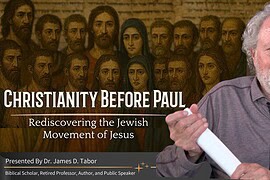

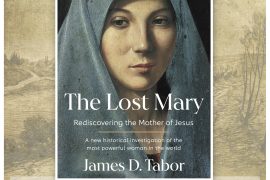
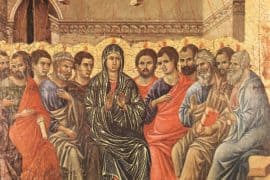
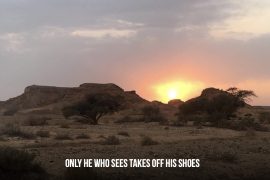

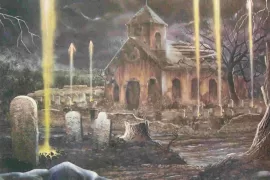
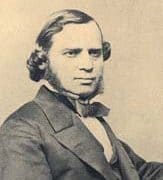
Comments are closed.